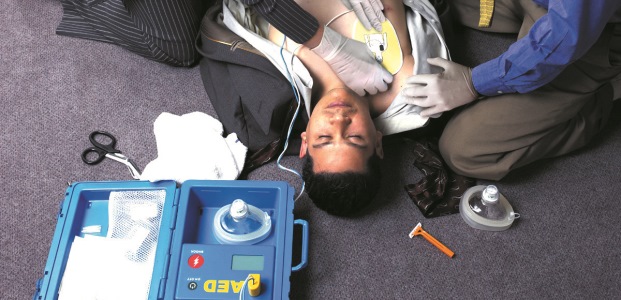
IOM Report, National Cardiac Arrest Collaborative Aim to Improve SCA Outcomes
The American Red Cross announced it will convene the collaborative Dec. 7 at the Emergency Cardiac Care Update 2015 conference in San Diego. Organizations that have committed to participate include the American Heart Association, Citizen CPR Foundation, and the National Registry of Emergency Medical Technicians.
A report issued June 30 by the Institute of Medicine's Committee on the Treatment of Cardiac Arrest calls for a campaign to promote public education and training in order to make more Americans willing to provide bystander CPR and defibrillation for sudden cardiac arrest victims. Annual rates of CPR and AED use by bystanders remain less than 3 percent in the United States, according to the American Red Cross, which announced its strong supports for the report's recommendation to encourage training through employers, local public health departments, schools, and community organizations. ARC also announced several actions it is taking in response to the report.
IOM established the expert committee, with support from the American Heart Association, the American Red Cross, the American College of Cardiology, the Centers for Disease Control and Prevention, the National Institutes of Health, and the U.S. Department of Veterans Affairs, to study the current status of cardiac arrest outcomes in the United States and opportunities to improve them. The panel reported approximately 600,000 people per year in the United States experience a cardiac arrest and that shortening the time between onset of arrest and provision of care is one of the best ways to reduce the risk of death and disability from cardiac arrest.
The report, titled "Strategies to Improve Cardiac Arrest Survival: A Time to Act," calls for the Joint Commission to collaborate with ARC, the American Heart Association, and other organizations to develop and implement an accreditation standard for health care facilities specific to cardiac arrest care. The Red Cross said it is ready to work with the AHA to bring this about and will put it on the agenda at the convening of the collaborative.
The report also called for creating a national registry to track out-of-hospital cardiac arrests and for enhancing the capabilities and performance of emergency medical services systems.
"This is an important year for resuscitation science, and this report dovetails with critical updates in emergency cardiac care coming in October," said Dr. David Markenson, M.D., a member of the committee. "It's important that we in the resuscitation field pay heed to the new recommendations in the IOM report so that we can marshall the necessary resources to continuously improve survival rates. If we want to improve cardiac arrest outcomes, the resuscitation field must demonstrate leadership and accountability. It must take action to safeguard the quality of life for those who suffer a cardiac arrest.”